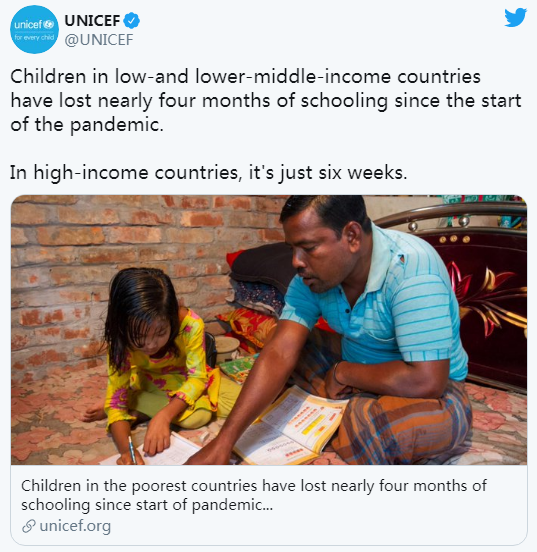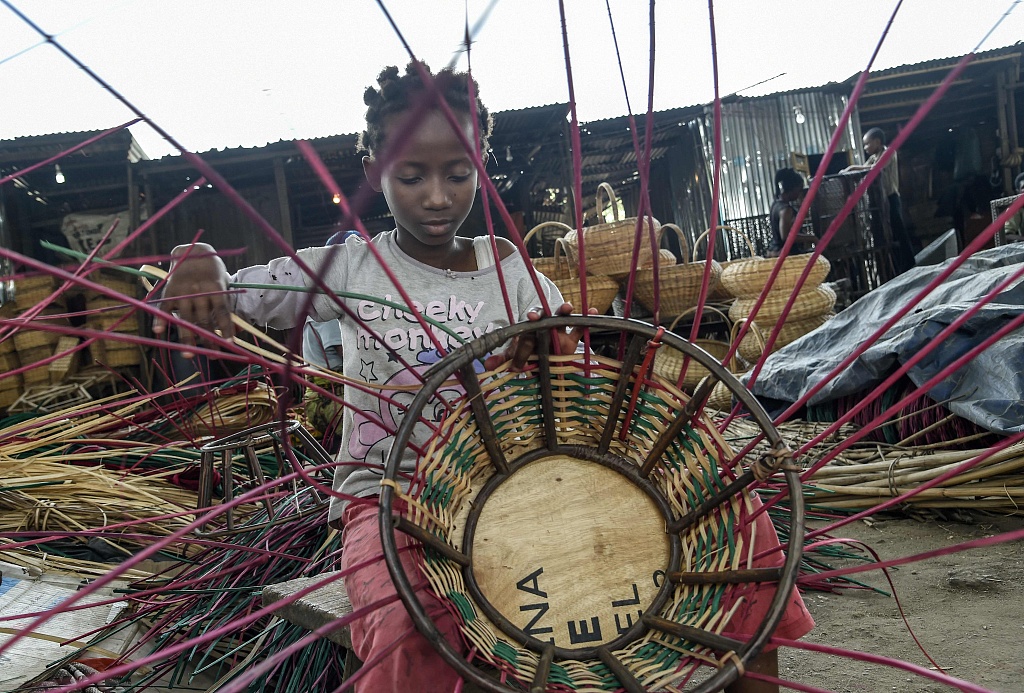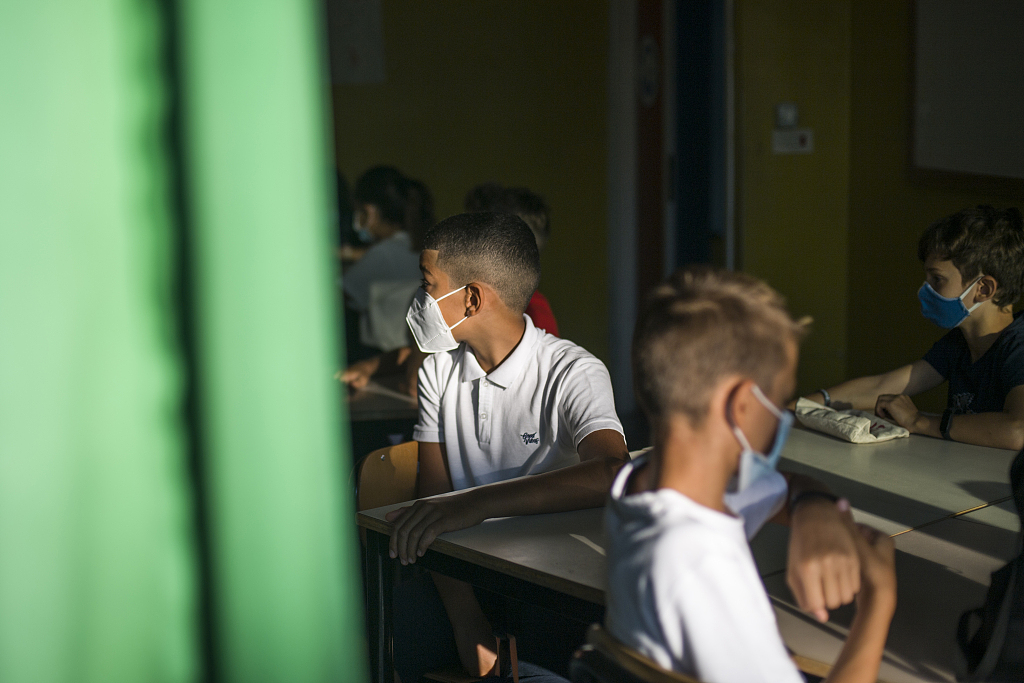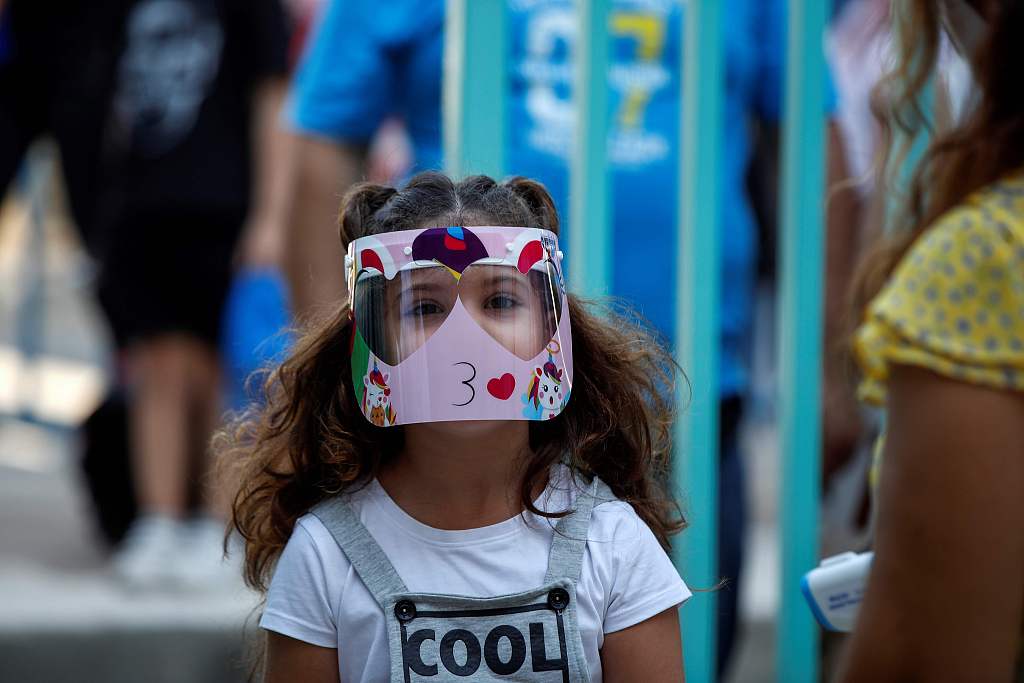The COVID-19 pandemic has robbed children in the poorest countries of nearly 4 months of schooling, compared to 6 weeks for their counterparts in high income countries, according to a joint report released on Thursday by the UN Educational, Scientific and Cultural Organization (UNESCO), the UN Children's Fund (UNICEF) and the World Bank.
The study is based on findings from surveys on "national education responses to COVID-19 including lost learning; remote learning support for students, parents and teachers; school reopening plans; health protocols; and financing," which were carried out in nearly 150 countries between June and October.
The new report found that students in low- and lower-middle-income countries were least likely to access remote learning and to be monitored on their learning loss. They also were most likely to experience delays in school openings and to attend schools with inadequate resources to ensure safe operations.

Screenshot from the UNICEF's Twitter account./ @UNICEF
Screenshot from the UNICEF's Twitter account./ @UNICEF
"We don't need to look far to see the devastation the pandemic has caused to children's learning across the world. In low and lower middle income countries, this devastation is magnified as limited access to remote learning, increased risks of budget cuts and delayed plans in reopening have thwarted any chance of normalcy for schoolchildren," said Robert Jenkins, UNICEF Chief of Education, in the press release.
"Prioritizing reopening schools and providing much-needed catch-up classes are critical," Jenkins added.
While schools have fully or partially reopened in more than two-thirds of the countries surveyed, one in four have missed their planned reopening date or have not yet set a date for classes to commence, and most of them are in low and lower middle income countries, the report said.

A child waiting for reopening of schools closed and needing to make ends meet is engaged in weaving different household items at Nigeria's largest cane 'village' under the bridge at Mende in the Maryland District of Lagos. /CFP
A child waiting for reopening of schools closed and needing to make ends meet is engaged in weaving different household items at Nigeria's largest cane 'village' under the bridge at Mende in the Maryland District of Lagos. /CFP
It also revealed that of 79 countries which responded to questions related to financing, nearly 20 percent have either already experienced or anticipate decreases to their country's education budget for the current or next fiscal year, compared to nearly 40 percent among low- and lower-middle-income countries.
Additionally, half of respondents in low-income countries said they do not have adequate funds for COVID-19 safety measures such as hand washing facilities or protective equipment for students and teachers, compared to 5 percent of high-income countries.
Stefania Giannini, UNESCO Assistant Director-General for Education, stressed that, "The pandemic will notch up the funding gap for education in low and middle income countries. By making the right investment choices now, rather than waiting, this gap could be significantly reduced."
Prioritizing remote learning

Pupils attend the reopening of school after closure due to the Covid-19 pandemic, on September 14, 2020 in Bologna, Italy. /CFP
Pupils attend the reopening of school after closure due to the Covid-19 pandemic, on September 14, 2020 in Bologna, Italy. /CFP
According to the report, nearly all countries have included remote learning in their education response, namely via online platforms, television and radio programs, and take-home packages.
Most countries, or nine out of 10, have facilitated access to online learning, usually through mobile phones or by offering internet service at subsidized or no cost, though coverage was "extremely varied," the report said.
It also showed that parents in six out of 10 countries also received materials to guide them in home-based learning, while four in 10 countries provided psycho-social counselling to children and caregivers during school closures. While these efforts were more common in high-income countries and in areas where resources were already available.

A pupil wearing a face mask arrives at a primary school on the first day of class of the new academic year in Athens, on September 14, 2020. /CFP
A pupil wearing a face mask arrives at a primary school on the first day of class of the new academic year in Athens, on September 14, 2020. /CFP
"Despite widespread efforts, there are large differences in countries' capacity to provide children and youth with effective learning. And there are probably even wider differences within countries in the educational stimulation children and youth have experienced," noted Jaime Saavedra, the World Bank Global Director for Education, underscoring the need for action.
"We were worried about 'learning poverty' before the pandemic and also about the inequality in learning opportunities. Now the learning baseline is lower, but the increase in inequality of opportunities could be catastrophic. The task of reigniting the learning process is extremely urgent."
(Cover: A high school student in her last year, attends classes at an improvised classroom in the yard of their school in Buenos Aires, Argentina, on October 13, 2020 amid the virus lockdown. /CFP)